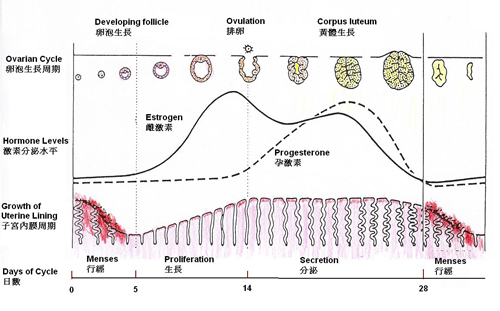Menstrual Irregularities
When approaching menopause, as ovulation becomes more irregular, the body's sensitive hormonal rhythm becomes unsettled and menstruation may vary from month to month. The intervals may be longer or shorter, menses flow may be scanty or profuse, and some periods may even be skipped. Moreover, the physical changes accompanying the menstrual cycle may become more intense and regular, such signs as breast tenderness, fluid retention and headache. See premenstrual syndrome (PMS).
Menstrual changes are usually the earliest signs of menopause; menstruation becomes more and more infrequent in the last 1-2 years prior to them stopping altogether. In order to assist the body as it goes through this transitional period, maintaining regular menstruation is always considered the highest priority. TCM claims that menstrual problems such as heavy menses, scanty menses, early or delayed periods, prolonged periods, missed periods, or abnormal menses flow indicate that different disharmonies have developed. Women of all ages should pay attention to menstrual irregularities and manage them as early as possible, before they turn into permanent and irreversible conditions and become potential risks for other health problems. Appropriate protective measures not only make menopause easier, but also help delay the natural aging process.
- Over-heated blood: short interval between periods, bright-red and scanty menses, thin in nature but may last a long time, flushed cheeks, insomnia, irritability, hot sensations in the palms and soles of the feet, red lips, red tongue, and rapid threadypulse.
- Blood deficiency: delayed periods, scanty and pale-colored menses, menstrual pain, general weakness, sallow face, lusterless skin, dizziness, palpitations, pale tongue and thready pulse.
- Blood stasis: bleeding occurs between periods or sudden profuse menses flow, dark-colored and clotted menses, pain in the lower abdomen that eases after excretion of the clotted menses, purplish spots appear on the margin of the tongue, and taut, hesitantpulse.
- Qi deficiency: early periods, light-colored, thin and profuse menses, fatigue, paleness, limb weakness, menstrual pain, shortness of breath, palpitation, pale tongue and weak pulse.
- Liver stagnation: irregular periods, non-smooth menses flow, dark colored and clotted menses, descending pain in the lower abdomen, breast tenderness, a tendency of sighing and belching, irritability and taut pulse.
- Kidney deficiency: bleeding occurs between periods, thin and pale-colored menses, darkened face, dizziness, ear ringing, lumbar soreness, fatigue, menstrual pain, urinary frequency, pale tongue, and a weak deep pulse.
 Events of a menstrual cycle
Events of a menstrual cycle


